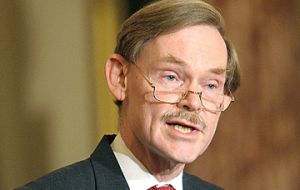MercoPress. South Atlantic News Agency
World Bank proposes steering group with emerging economies
 Zoellick: the former Bush official preaches multilateralism
Zoellick: the former Bush official preaches multilateralism The Group of Seven is no longer effective and should be replaced by a steering group that includes new emerging economic powers like China, India and Brazil, World Bank President Robert Zoellick said on Monday.
In a speech ahead of meetings in Washington this weekend of finance leaders, Zoellick said the US financial crisis was a "wake-up call" and showed more cooperation across borders among a bigger group of countries was needed. "The G-7 is not working. We need a better group for a different time" Zoellick said in a speech to the Peterson Institute for International Economics in Washington D.C. "For financial and economic cooperation, we should consider a new Steering Group including Brazil, China, India, Mexico, Russia, Saudi Arabia, South Africa, and the current G-7." The G7, group of rich countries includes US, Canada, UK, Germany, France, Italy and Japan. "The new multilateralism, suiting our times, will need to be a flexible network, not a fixed or unitary system" Zoellick said. "It needs to maximize the strengths of interconnecting and overlapping actors and institutions, public and private," he said. He said the steering group should include finance ministers from emerging economies, however, it should not be limited to any number of countries but should be flexible and evolve with the times. Such a group would bring together over 70 percent of the world's gross domestic product, 56 percent of world population, 62 percent of global energy production, the world's major carbon emitters, donors, and the main players in global capital, commodity, and exchange rate markets. The new global system should respect state sovereignty but required a "sense of shared responsibility," he said. Zoellick said the group should meet regularly either in person or through video-conferencing and with the help of the World Bank and International Monetary Fund identify emerging problems and suggest solutions. Zoellick, who has served in high-ranking foreign and economic policy posts under three Republican presidents, said the next US president, while dealing with the aftermath of the financial crisis, should encourage broader global participation. "That work is not about America alone. Both candidates have spoken about strengthening the sinews of America's ties with the world. How the next American President will do this, matters," said Zoellick. Zoellick has won the attention of international economic officials in recent months for calling attention to the global food crisis and the danger it posed to developing countries. He has warned that the "double jeopardy" of higher food prices and now the financial crisis could be a tipping point for developing countries. "The stark reality is that developing countries must prepare for a drop in trade, capital flows, remittances, and domestic investment, as well as slowdown in growth," he said. Zoellick said the drop in exports and capital flows will affect investments, while a decline in growth and worsening credit conditions, combined with monetary tightening, will trigger business failures and possibly banking emergencies. "Some countries will slip toward balance of payments crises. As is always the case, the most poor are the most defenceless," he added.




Top Comments
Disclaimer & comment rulesCommenting for this story is now closed.
If you have a Facebook account, become a fan and comment on our Facebook Page!